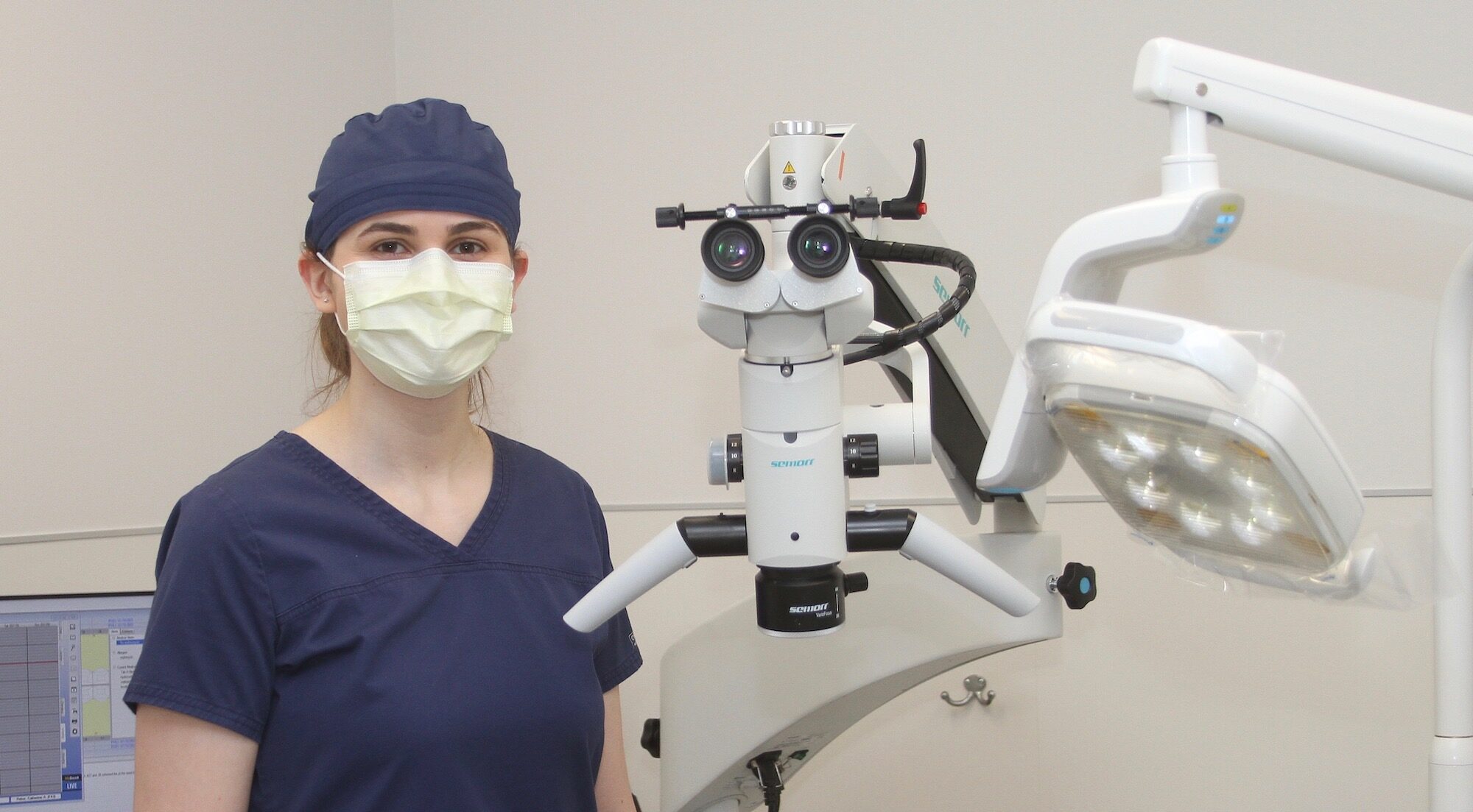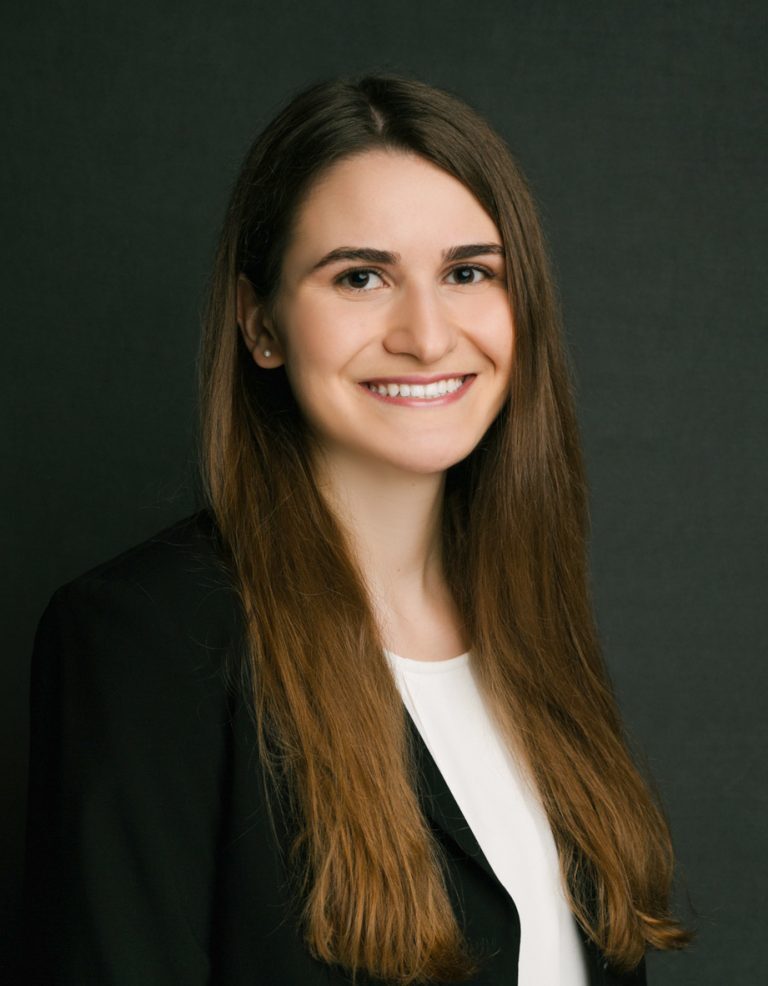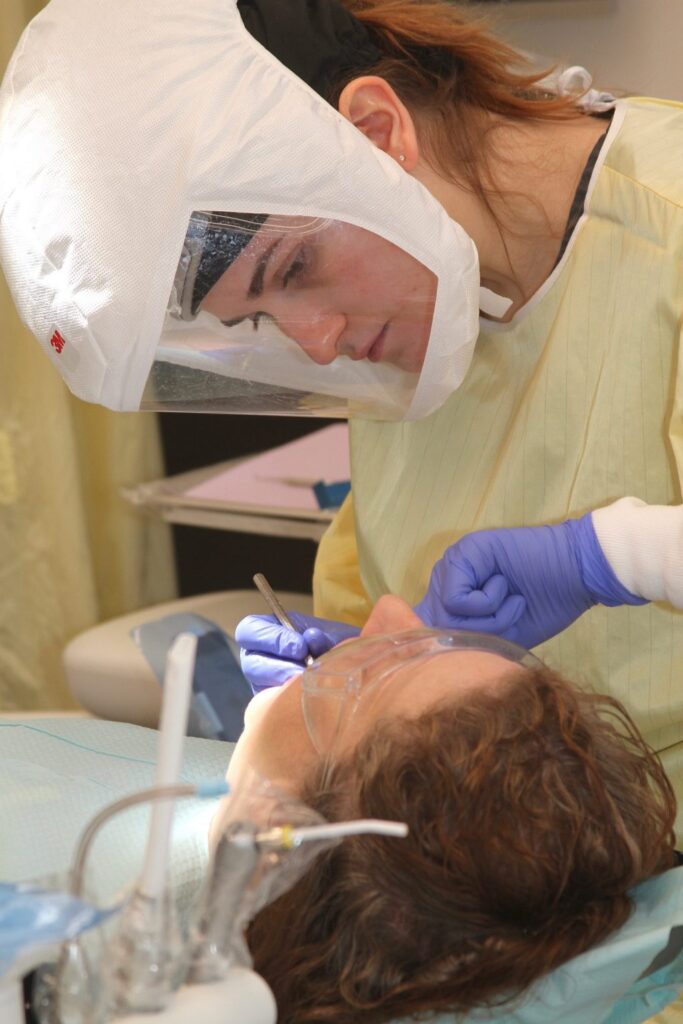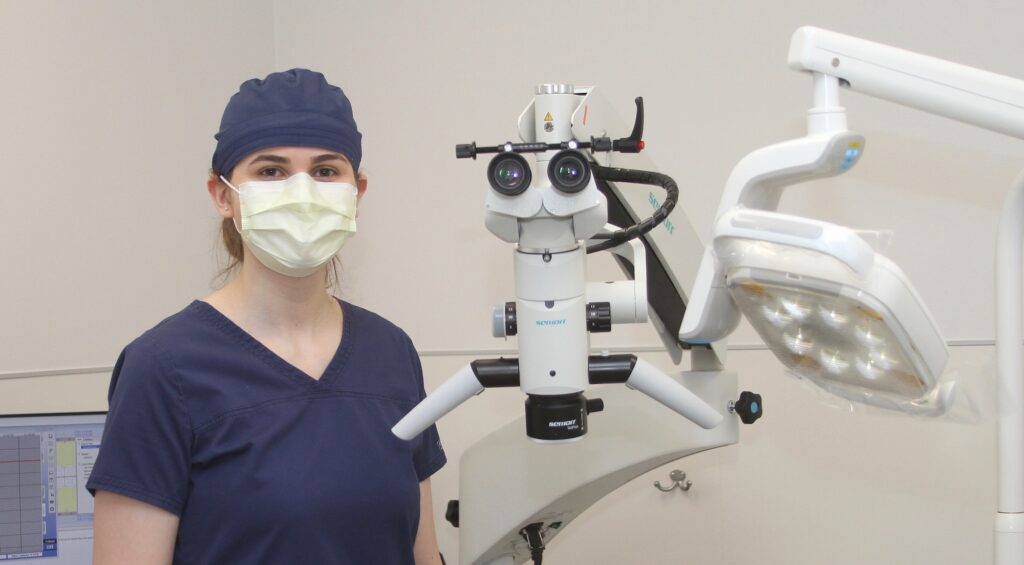
Lexi Glinos is focused on helping those around her, whether it is relieving patients’ pain, preserving their teeth, communicating in their native Spanish language, or helping students navigate academic challenges.
A fourth-year student set to graduate from the University of Michigan School of Dentistry this spring, Glinos intends to weave a fluency in Spanish into her practice of dentistry, while drawing from the resilience she gained as a child and from confronting several distinct challenges, including lung surgery, during dental school.

Glinos, whose father is a general dentist, has decided to specialize in endodontics and will continue her studies this summer in the graduate endodontics program at the University of Iowa. After shadowing an endodontist as an undergraduate, she describes the specialty as “the emergency room of dentistry.” The focus of endodontics on pulp and tissue inside of teeth, with root canals often the solution to relieving patients’ pain, sharpened her clinical interest and sparked her imagination in making it a career.
In her written personal statement to graduate school, she summarized the importance of the specialty this way: “I recall observing re-implantation, horizontal root fracture, and avulsion cases and being in complete awe of the extensive treatment options that existed to save teeth, even when it seemed impossible. I also saw first-hand the emotional and psychological impact that saving one’s natural dentition has on the patient, often sighing in relief upon learning that their tooth can be saved.”
In dental school, she developed a fascination for the evidence behind the patient care that she had observed in her shadowing experience. Through cases presented in endodontic courses and seminars, she gained an appreciation for the complexity and constantly developing nature of the field. Simply put, she said, the discipline is “focused on getting patients out of pain and on keeping their teeth.”
Empathy for dental patients comes from a strong level of empathy developed during her childhood. She grew up with a younger brother with profound special needs. When Glinos was eight years old, she moved from suburban Chicago with her mother and two brothers to Kansas for a special school for him
Glinos grew to understand the power of meaningful relationships and of service to others, as seen through the experiences of her brothers and grandparents. “Observing the impact that the interdisciplinary team of physicians, dentists and therapists had on improving the quality of my brother’s life oriented me toward a career where I could reduce the suffering of others. Coupled with my passion for the sciences, industriousness and desire for autonomy, I was steered toward dentistry.”
Along with her clinical focus, Glinos is equally clear on her desire to practice and live in an area where there is a large Spanish-speaking community and where she can help improve lives. It was an interest kindled during her high school years in the Chicago suburb of Streamwood and reinforced during study-abroad trips in college.

She said Streamwood and the neighboring town of Elgin are home to lots of Spanish-speaking people, which allows her to use the Spanish she learned in her high school classes on a regular basis in the community. “I fell in love with the Spanish language through the culture, and I had really good teachers in high school who encouraged conversation,” she said. “In stores or with neighbors, I would take any opportunity to practice.” Being multilingual came naturally; Glinos’ maternal and paternal grandparents are Greek, and her parents speak fluent Greek to them.
While most pre-dental undergraduates choose a science major, Glinos decided to major in Spanish because she knew she would never have the opportunity or time to nourish her love of the language if she didn’t make it a priority in college. So while she was also taking the required pre-dental courses at Miami University in Oxford, Ohio, she was also immersed in Spanish. During her sophomore year, she spent a semester studying in Guanajuato, Mexico, located in the central part of the country. She also did a summer trip to Cusco, a town in the Peruvian Andes, where she assisted dentists and doctors who bused up to the villages in the mountains to treat patients who otherwise might not get such care. She also has taught abroad in Spain, instructing middle and high school students in English classes and in science courses, which they take in English.
Glinos’ passion for teaching and mentoring extends beyond Spanish and dentistry. Even with her busy schedule as a dental student, she finds time to tutor both dental students and college students. She tutors about 15 undergraduate students per semester online for a total of 20 hours a week, focusing on the challenging and often required course of organic chemistry. Her tutoring started in high school and continued during her undergraduate years. Earning her master’s degree would include a focus on academic dentistry, which gives her options for faculty positions, in addition to whatever type of private practice she pursues.

She credits some of the exceptionally passionate and driven teachers she’s had as inspiration to now pay it forward to others. “I have found immense joy in teaching others,” Glinos said. “In fact, witnessing students that I have tutored achieve their academic goals has been more fulfilling than any scholastic achievement of my own.”
As her time at the U-M dental school comes to a close, Glinos reflects on how she evolved and overcame obstacles during the four years. She relishes the friendships she’s made with classmates during a challenging run. “We’re in there struggling together with the tough courses; we see each other in the same classes day in and day out,” she said. “It’s kind of like high school in that way. I never felt like anyone was in it for themselves. It feels like this is a team that is trying to get through this together.”
Even more challenging than her academic and clinical requirements for dental school was a health scare that hit suddenly halfway through her second year, on Feb. 24, 2020, just before the onset of the COVID-19 pandemic. It happened as she was treating her first-ever patient during an appointment in a dental school clinic. She was excited that the general exam and teeth cleaning were going well, but as she was applying fluoride varnish to the patient’s teeth, she suddenly felt a sharp chest pain in her left side. She tried to ignore it, thinking it was a muscle spasm. After two weeks of multiple appointments and misdiagnoses, she got a call from her doctor while at the dental school that her lung had collapsed, and that she needed an emergency chest tube. She was taken to the Emergency Room by her patient care coordinator, Mary Garrelts.
“I was terrified,” Glinos recalls, but there was more to come.
Her left lung collapsed a second time on March 15, 2020, three weeks after the first collapse. Due to limited hospital capacity with COVID-19, she was sent home for two weeks with a chest tube, as she tried to keep up with her dental school coursework. She was also informed that she would need surgery to prevent future collapses. However, surgeries like hers were stalled when the pandemic hit because of the crush of COVID-19 patients at hospitals. She was put on a waiting list for the surgery. Meanwhile, the dental school routine was also up-ended. The school remained open, but students moved to virtual learning for their classroom work, and their clinical education was limited by pandemic protocols that significantly reduced the number of patients and appointments.
Two months later, in May 2020, doctors finally performed the more comprehensive surgery on her left lung. Glinos says that recovering from lung surgery while attending dental school during a respiratory pandemic was challenging. With daily effort, she made great strides, a reminder of the emotional strength she’s exhibited throughout her life. “After several months of daily exercise at the track and physical therapy to address chronic pain, I went from breathless walking to running a 5K a few months later,” she wrote later in summarizing the ordeal.
She got back on track at dental school and things went well until Dec. 22, 2021, when her right lung collapsed. Fortunately, by then the pandemic had subsided enough that she was able to have surgery on that lung the very next day. Then she had to re-start the therapy to restore her breathing.
With a couple of months now left before she graduates, she has recovered and is finishing up clinical requirements for various types of dental treatment for her patients. The only obvious indication of her recent health challenge is that she wears a different type of head covering than other students during patient appointments. Instead of a face mask, safety glasses and a face shield, Glinos has a larger breathing hood that resembles hazardous materials gear. The hood is connected to a battery-powered air-purifying respirator that recirculates filtered air inside the hood and allows for easier breathing than the more restrictive face mask.
Glinos chooses to view her personal health story as yet another example of her ability to forge ahead through difficult times in life. She turned it into a positive in her application to graduate school, writing, “I am confident that the resilience and perseverance that I have demonstrated in my upbringing, as well as in my academic and personal journey through dental school, will enable me to confront obstacles ahead in my graduate career … in hopes of eventually becoming a successful endodontist in clinical and academic dentistry.”
Glinos says she expected dental school to be difficult and the first year was harder than she imagined, presenting challenges in terms of time management and a daunting course load. She adjusted and “got into the swing of things” by the start of her second year, but then had to deal with the first lung collapses and surgery in the second half of that year. Things went well in her third year and first half of her fourth year before the second lung episode meant yet another diversion that could have thrown her off track – but it didn’t.
Undaunted, she remains upbeat and introspective as she nears the finish line for her DDS degree: “I learned a lot about perseverance and resilience, and had a lot of experiences where I’ve overcome difficult challenges,” she said. “You can do a lot more than you think you can.”


